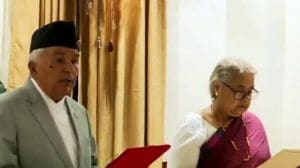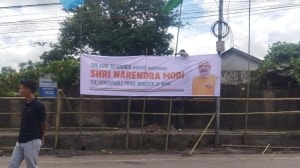IIM-A study praising Lalu’s Railway turnaround was paid for by Lalu’s Ministry
Responding to an RTI application filed by The Sunday Express, Ministry reveals: For 26-page report on ‘turnaround,’ IIM-A was paid Rs 4 lakh plus research expenses plus overheads; author was hosted by Railways across the country. It was IIM-A which rolled out the red carpet for Lalu after which Harvard, MIT came knocking

The “critical appraisal” by the Indian Institute of Management, Ahmedabad, on the “turnaround” of Indian Railways, which sang paeans to Railway Minister Lalu Prasad Yadav’s “astute understanding of market reality,” was paid for by the Railway Ministry.
The amount: Rs 4 lakh plus service tax plus “expenses of research assistance, computer usage and overheads at IIM-A/Ahmedabad.” The author of the study, IIM-A professor G Raghuram, was also provided “rail travel (complimentary passes)/air travel, accommodation (rest house), local hospitality, data covering and analysis support.”
This fact has been revealed by the Ministry in a reply to an application filed by The Sunday Express under the Right to Information Act this month. Raghuram’s report doesn’t mention this sponsorship.
The Ministry says that the Railway Staff College, with IIM-A, conducted the study and the “deliverable” is a “case study along with teaching note to be used as training material.”
Significantly, this report was ready in September 2006 — the study began in May that year — and IIM-A rolled out the red carpet for Lalu on September 18 when he visited the campus, catapulted to the status of a “management guru.”
It was after Lalu’s appearance at IIM-Ahmedabad that delegations from Harvard Business School, Wharton University, Boston University, American Defense Institute, U.S. Financial Services Industry Study Group, MIT’s Sloan business school visited Indian Railways to hear the “turnaround story.”
“There are many studies we do at the institute where the subject pays for the cost,” Raghuram told The Sunday Express. “The payments are made to cover the costs and the faculty’s time. Even in this case, the payment made was not huge.”
When asked about the propriety of asking a subject for funding when the study is a “critical appraisal” of
the subject, Raghuram said: “A study sponsored by a subject does not necessarily compromise its objectivity. As academics, we also don’t want the objectivity of a study to be influenced. I had been wanting to see the new initiatives introduced in the Railways. For that, I proposed to the Railways that I wanted to conduct a study, to which they responded favourably.”
The 26-page IIM-A study, which has over 45 pages of annexures, praises the “style of the Minister”, his “non-interference” in dealing with the Railway Board, his “direct approach” while communicating with zonal General Managers, “caring attitude towards staff and unions”, his image-building through the media. And even his ability to identify the right people as reflected by the choice of his OSD Sudhir Kumar.
For the record, between May 4 and July 14 in 2006, Raghuram traveled to Lucknow, Kolkata, Dangoaposi, Noamundi, Tatanagar, Bellary (Hospet), Toranagallu, Bannihatti, Ranajitpura, Yashwantnagar, Tunga Bhadra Dam Weigh Bridge, Kariganuru, Hubli and Chennai. He also held meetings with top railway officials from the ministry and PSUs like SAIL, NTPC and CONCOR in New Delhi. The Sunday Express: “A study sponsored by a subject does not necessarily compromise its objectivity. As academics, we also don’t want the objectivity of a study to be influenced. I had been wanting to see the new initiatives introduced in the Railways. For that, I proposed to the Railways that I wanted to conduct a study, to which they responded favorably.”
WHAT THE IIM-A REPORT SAID
• “It was a commonsense-based approach, showing an astute understanding of market reality, asset base of IR and the expertise and capability of the IR’s management and systems… He followed this up with the principles of leveraging the assets, empowerment and delegation. He has demonstrated that good economics is good politics.”
• “He had a positive approach in dealing with the staff and unions. The unions wanted a doubling of the contribution to the staff welfare fund. He offered them more. When he saw that gangmen were not provided footwear as part of their equipment, he ensured the same.”
• “When concerns were raised about downsizing, he came out with his Hindi one-liner which translated to, ‘Downsizing may make IR thinner, but not necessarily healthier.’ His pitch was, ‘regenerate competitiveness and leverage resources rather than restructure and downsize’. He believed in instilling hope and excitement rather than fear and anxiety.”
Photos





- 01
- 02
- 03
- 04
- 05


























